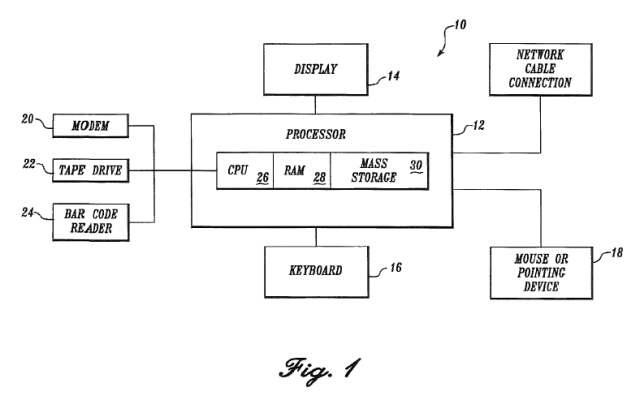
(credit: USPTO via EFF)
"Personalized content" is a phrase so vague that it could mean just about anything. That quality makes it just about perfect for use by a patent troll. This month, the Electronic Frontier Foundation's patent lawyers have honed in on a patentdescribing a way of "presenting personalized content relating to offered products and services," owned by Phoenix Licensing LLC, a patent-holding company controlled by Richard Libman, an Arizona man who's sued more that 100 companies.
The main claim of US Patent No. 8,738,435is little more than a description of sending a "communication" with "identifying content" to a "plurality of persons." The patent essentially describes any type of personalized marketing, as long as it involves a "computer-accessible storage medium."
In other words—personalized marketing, but on a computer.
But in lawsuits filed on behalf of Libman's companies, like one against SF-based Credo Mobile, his lawyers say the patents "go beyond simply describing a way to computerize a manual process." They also "describe a process of choosing product characteristics, or customizing products, for a specific individual... using decision criteria, then creating customized offer communications from same, all in a mass-produced way."
Earlier mass-mailing systems "produced output that was either non-customized or just customized to address a given person" and could not select products and "characteristics appropriate for a given person," Libman's lawyers write.
Wordy language notwithstanding, the patents look like the type of "do it on a computer" claims that should get tossed out as "almost surely invalid" under the Alice v. CLS Bank Supreme Court precedent, EFF lawyer Daniel Nazer explains in his blog post. "Unsurprisingly, given that its patents are so vulnerable to challenge under the Alice standard, it has filed all of these lawsuits in the Eastern District of Texas." That plaintiff-friendly court is less likely to invalidate patents under Alice.
But the newest Phoenix Licensing lawsuits are all based in East Texas, despite the fact that inventor Richard Libman is based in Arizona, and his targets are all over. In the lawsuit against Credo Mobile, the complaint shows how Libman and his lawyers believe that essentially any type of personalized marketing offer infringes their patents.
Libman's attorneys hail from Russ August and Kabat, a Los Angeles firm that also represented TQP Development, one of the most successful patent trolls, in its trial against Newegg. The same team of lawyers now representing Libman won a $2.3 million jury verdict for TQP, but the TQP patent was invalidated in post-trial action.
Libman continues to get "continuation" patents, essentially variations on his original 1996 application that change the wording around, but preserve his 1996 "priority date" for lawsuits. "But this is not evidence of inventiveness," argues Nazer. "Rather, it simply shows that the Patent Office is asleep at the wheel."
Like many lawsuits filed by patent-holding companies, the Phoenix Licensing complaint spends some time venerating the named inventor, who, once upon a time, had a business other than patent lawsuits. "[T]he public has benefitted from Mr. Libman's disclosures," Libman's lawyers state. Before Libman invented personalized marketing, they claim telemarketers and agents "worked within a limited universe of defined products and services, and worse, with limited information about them and their customers."
News articles from 1997 and a press release from 2001 are quoted in the complaint, discussing Libman's company ICA Insurance Marketing. As president of ICA, Libman worked with banks to send offers of insurance based on demographic information in their accounts.
Ars called Libman to ask about his inventions, but he refused to discuss them. "I can't do that," he answered. "I'm "You know that, Joe. I'm in litigation, as you know."
Asked why he sued more than 100 companies seeking licensing fees, Libman said, he answered, "I'm not going to even comment on that."
The only thing Libman would say about his career of patent lawsuits is that he had read the EFF blog post, and he didn't think much of it.
"It's written by somebody who didn't bother taking a look at the history of the patents," said Libman. "I'm not a troll. I'm the inventor on all my patents. This is just one of a myriad of articles, on a myriad of different inventors, calling them names and trying to support the anti-patent movement that seems prevalent these days."

